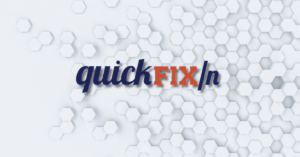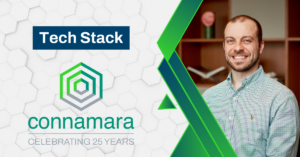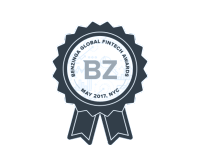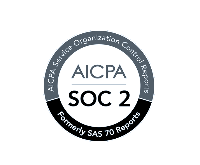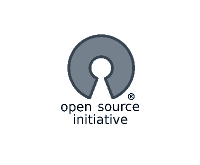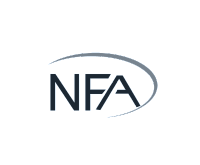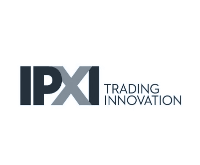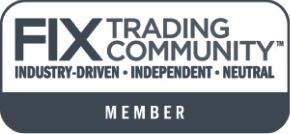
Connamara has always had a strong engineering team — over the past two-plus decades, our engineers have successfully delivered an incredible range of complex solutions for a wide variety of clients in capital markets and beyond. However, as talented as they are, they are equally averse to self-promotion.
Although they don’t seek it out, we feel our engineers deserve a spotlight — not just for their skills and track records, but for their unique backgrounds, perspectives, and insights. Thus, we are starting this series to introduce you to some members of our engineering team, the people behind the projects we deliver.
Our first Connamarian engineer is Mike Gatny, who currently serves as both Vice President, Engineering, and Head of Sales Engineering. Read Part One of our conversation with Mike, lightly edited for readability, below.
***************************************************************************
What is your role at Connamara, and what are your responsibilities?
I currently serve in two roles: Vice President, Engineering and Head of Sales Engineering.
As VP, Engineering, my duties are to provide technical oversight to every project — in some cases I’m not really on the project, but I’m available as a resource. By providing my perspective on issues that may arise, I almost serve as an internal consultant to the team. That’s the main focus, but there are also other minor responsibilities related to recruiting, staffing, and management that come into play as well.
As Head of Sales Engineering, I help the sales team close the deal with prospective clients — after Dan Curry [Head of Business Development at Connamara] finds a prospective client, I join the conversation to answer technical questions about the consulting services we provide, and about our EP3 (Exchange Platform 3) solution. It’s about interfacing with prospective clients, but also having the technical expertise to know what we reasonably can or cannot do.
My new challenge in 2020 is taking over the management of our staffing pipeline. This is a bit of a balancing act. Projects come in through sales, people come in through recruiting, and the right mix has to be found between the two. Do we have enough people? The right people? Are they doing the right work? Work that matches their skill sets? We are always striving to optimize the staffing pipeline, to put people in the best position to succeed, and to provide our clients with the best possible support.
How long have you been at Connamara? How has your role changed over that time?
I’ve been at Connamara since 2006 — this spring will be my 14th anniversary. Although technically, like two others on the management team, I took a brief three-month “Rumspringa” before rejoining Connamara. But that’s another blog post…
Anyway, back in 2006, I started out as an engineer, and my role was to write code. At that time, [CEO] Jim [Downs] was managing all of our projects, doing all the sales, writing all the proposals, handling recruiting, etc. As my understanding of those non-code-writing functions grew, I took on more and more of them.
I still write code, but today my most important job is to help everyone on every team keep every project moving forward. Sometimes that means sharing a screen with an engineer to debug a tricky piece of code, other times it means flying out to a prospective client’s office to close a deal. And it always means being a part of our organizational memory — knowing how we do things, why we do them that way, what worked in the past, and what did not.
How did you originally get to Connamara?
During my senior year at the University of Michigan, I answered a posting on the university’s jobs board for a part-time, intern-level position at The Linux Box in Ann Arbor. On my third day working there, they offered me a full-time job, which I accepted. That turned out to be one of the best things that ever happened to me. I learned a tremendous amount about both engineering and consulting, and that experience set me up to succeed at Connamara.
After a few years at The Linux Box, I started thinking about what to do next. I had an urge to move to a larger city, so I posted my resume online to see what would happen. And, just like that, I started getting phone calls from recruiters for Chicago trading firms. To my surprise, an industry that I never knew existed was very interested in programmers who knew C++, Linux, and test-driven development.
A recruiter set up interviews at a few firms, I got offers from each, and I chose Connamara. That decision was easy, and it was based on my impression of Jim. I remember thinking: I want to work for that guy. If you have read our blog post about company values, I think you’ll see why.
Why do those values resonate with you?
Our team at Connamara is a group of people I can trust — personally, professionally, and technically. I don’t think I could go to work every day without that kind of confidence in my teammates.
We don’t lie to our customers. We tell them the hard truth: if we are over budget, if we are behind schedule, if the interpersonal chemistry isn’t right. Our culture comes from the top, and Jim represents that. It’s a combination of old school trading pit mentality and Midwest straight-shooter values. Honesty, straightforwardness, and a work ethic that matches.
How can a team of engineers, like the ones at Connamara, combine to be more than the sum of their parts?
At Connamara, we work on different projects all the time, and so we are always shuffling people into different teams to match the things we’re building. In order for this to work, we seek out what others have described as “T-shaped people” — they have deep expertise in a few areas, but they have a wide variety of other skills as well.
When you bring people like that together, they will catch each other’s mistakes. Someone always spots the crucial detail that everyone else missed. Someone always knows how to do that one thing in the debugger that saves the day. Someone always remembers how we saw this same thing five years ago and what we did to work around it. There has never been a single time where we had to give up because no one had the expertise required to move us forward.
As a result, we have a virtuous cycle — we learn from each other, our confidence in each other grows, and we are able to take on even more ambitious projects.
Stay tuned for Part Two of our talk with Mike next week.
